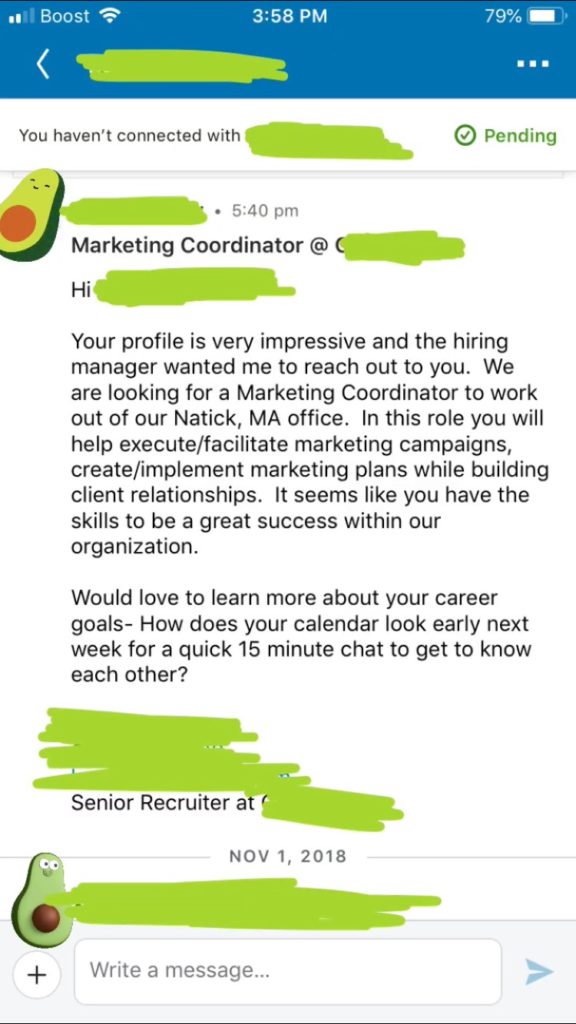How to Get a High-Paying Job, Part 3: Talk to Recruiters
The final piece to the high-paying-job puzzle is putting your research and prep from Parts 1 and 2 into practice! Now your LinkedIn profile is optimized to the high-paying jobs you’re out to get. Recruiters will now be finding you and reaching out with potential roles in mind. Much of your success with them will come from confidence you can do the work and comfort in doing so. Both of these will come with practice, or getting familiar with leveraging your research and prep in real life.
LinkedIn Messages and More
With an optimized LinkedIn profile for recruiters to find, I found that recruiter interest build over time. Knowing that, I’d suggest you connect with recruiters that request to connect with you. You should also request to connect with recruiters who work at companies you’d like to be a part of. Oftentimes they’ll either comb through their connections or post about new high-paying jobs to find candidates like you for it. Staying connected with them helps you further by getting a grasp of what the job market looks like. It’s a lot easier to switch to higher pay if there’s a huge demand for the work you can do.
Now, before they talk with you on the phone, they’re going to talk to you via LinkedIn message and email first. Keep your messages kind, to-the-point, and grammatically excellent. The more you respond to recruiting messages, the more you’ll get used to sniffing out a good deal versus a bad one. And add a professional email address to your profile – only the best recruiters will email you directly, as that means they actually took the time to read your profile/look at your contact info instead of sending mass messages across the interwebs.
Generally, the written pleasantries are just to make sure you can be punctual about responding and can write English real good. Before you begin taking phone interviews, remember my twist on a old phrase: talk is cheap. In this case, it means you can afford talk no matter what your budget looks like; you should NOT limit your career talk to these phone calls with the recruiter. Talk to yourself (in private) about how great of a fit you are for the position.
We’re not gunning for perfection here, just repetition. “I’d make a great product manager because of X. And Y. And also Z.” Say this out loud to yourself while you’re doing chores. Pretend you’re on the phone and say it aloud. Maintain eye contact with your reflection as you say it in front of a mirror. It helps your brain soak up the message and rally behind your focus completely.
When I tried this I was absolutely shocked by how much it impacted my advancement. Hiring managers responded much more enthusiastically to my confident questions and answers. Give yourself the tools within your power to make this as easy as possible.
Every Interview Offer is an Offer to Practice
With an up-to-date profile that indicates you’re open to opportunity, recruiters will come through. When you’re first starting out, always, always, always interview with the recruiter. I don’t care if the job is an unholy fit or far off in Timbuktu. Interview anyway for the practice alone.
Even if you totally bomb an interview with one (or several) of them, job recruitment is so large an industry that there will still be more a-knocking. At the very least, you’ll get another chance at practicing your interviewing skill WHILE ALSO staying up-to-date on what recruiters are looking for.
Really, what you want to do is make a pattern for yourself to follow for financial success. Humans have an innate love for patterns, or repetition. Use psychology to your advantage by making patterns about presenting your excellent career fit to employers. The more you interview, the more comfortable your brain gets in that situation, making it a smoother experience overall.
If you’re still nervous, don’t be shy with asking recruiters for any further tips to help you along. They’ve built careers on helping others move up and can definitely offer a tip or two. Keep your feedback request specific to how you present yourself; they like answering these questions more anyway than a question like “Why wasn’t I picked for this job you interviewed fifty other people for?” Maybe after Googling you they find your old college frat photos. Maybe they don’t see the connection between your high-paying job and your current one. Whatever it is, it can help you know what to fix. In this case, improving your optimized resume and getting those pics taken down.
Practice Makes Other Paths Easier to Trod
What’s awesome about these new interview skills is that they’re transferable to other applications. Remember that list of potential job titles you got in your research? It might be worth taking your top three titles and seeing if employers are more desperate for them. I wouldn’t go about optimizing your LinkedIn profile to your less-desired roles; just test the waters with your new interview skill set.
For my product management example, I might go back to my note cards and see what’s out there for executive assistants to chief product officers. Maybe I’ll hit it at just the right time and find some incredible niche that needs filling. Maybe I’ll meet someone in the interview process who hires me for an even better role later on. I’ve already put in the preparation for a high-paying job, so why not open myself to more opportunity?
And opportunity, for you, is now plentiful. With this practice with recruiters, it’ll be easier to go to career events and explain what you do and what you’re looking for. “I’m a business analyst looking to break into product management. Which companies out there should I go and talk to?” Conversations become easier as you’re more comfortable talking about your accomplishments and ambitions. Neither should be a secret. Help out those around you with questions about their own accomplishments and ambitions. People like feeling valued, and your listening to them highlights you as a valuable person.
But That’s Not All!
Because high pay is only one part of the finance equation, I’m going to pitch one last thing to you as well. Since it’ll take time to put these things in place, see if you can’t further optimize your budget in the meantime. This will give yourself more financial leverage and, thus, better mental space for those potential job offers. I mean, if you can do THIS, doing something else difficult is another thing you can do.
If you’ve completed all 3 steps and recruiters still aren’t reaching out, it’s time to check out Part 4 for the super in-depth scoop on what to do.
Is there anything else you should keep in mind while pursuing a high-paying job? Let me know down below – your experience could help someone else change their life.



